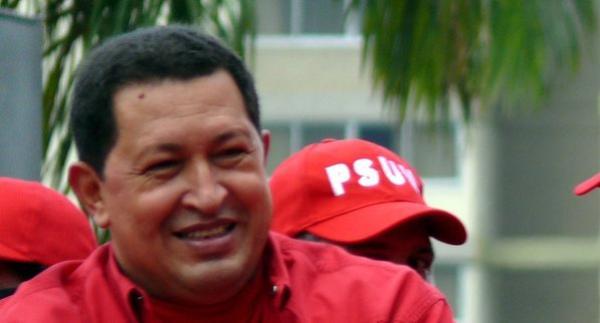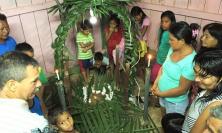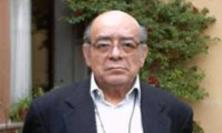Venezuelan Jesuit, Raúl González Fabre, examines the rise of President Hugo Chavez and the economic and social factors that keep him in power.
In the early morning of 3rd December 2007, after several tense hours teetering on the brink of civil war, the National Electoral Council of Venezuela announced that the new Constitution, proposed by President Hugo Chávez, had been rejected by popular vote. In a televised speech the President accepted the result, though he stressed that he would continue to attempt to push through the same overturned Constitution. His supporters withdrew the armed squads which they had gathered in the major cities, and his opponents put by for another day the plans for street resistance which they had drawn up in case of electoral fraud. Civil war did not break out on December 3rd in Venezuela.
The question is, how did things get to a stage where armed confrontation between opposing political and military factions could become a genuine possibility, avoided only through the decision of one man to accept the result of a vote? And above all, how did things get to this stage in Venezuela, a country with a substantial democratic tradition, by Latin American standards (its last military dictator was ousted in 1958), and with more than substantial natural wealth in oil, iron, aluminium, hydroelectricity and gold?
To understand the whole process of "Chavism" and where it stands now, it will be necessary to offer a sketch, however brief, of Venezuela's economic structure. The last ninety years of Venezuelan history cannot be understood without reference to oil. As in all countries with a legal tradition of Spanish origin, the wealth under
Venezuela's soil belongs to the State. This means that the Venezuelan state derives an income from oil that is generous but as volatile as oil prices themselves. To a great extent, this income can be distributed by the government in whatever way it wishes, because it is not derived from any productive effort on the part of Venezuelan society. It constitutes what is sometimes called 'oil manna'.
It was the emergence of oil, early in the twentieth century, in the agrarian economy of Venezuela, a poor and backward country with an economy based on rural subsistence farming and ravaged by epidemics, that determined the route by which the country would seek to modernize itself. Driving this impetus towards modernization would be neither the capitalist bourgeoisie nor the working class, but the state itself. The basic resources would not be entrepreneurship and the efforts of workers, but oil revenues derived from foreign countries. They would be the foundation for building the business class, workers and consumers, who did not as yet exist in Venezuela, once a modern state was constructed.
Broadly speaking, two strategies can be distinguished in this plan: Until 1958, authoritarian military governments favoured the use of oil revenues for the construction of an
infrastructure and the creation of a private capitalist sector. After 1958, democratic civil governments included in their policies the development of the population itself, through
migration to the cities, the setting up of universal, public and free educational and health services, and the granting of considerable subsidies to encourage consumption. The idea at the time was to produce Venezuelan citizens who could play their role in modern private and public businesses, which were also subsidized and protected by the State.
The idea that a modern economic state could be constructed around an unearned income like oil revenues would have revolted Adam Smith. In fact Smith saw the rent-earning class as the irreconcilable enemy of the commercial class. Smith was right: in the presence of an income that can be appropriated without risk or effort, entrepreneurs do not become genuine entrepreneurs and workers do not become genuine workers. They all tend to become rent seekers.
Various ways emerged of gaining petrol revenues without producing anything particularly useful: dollars and cheap imports, direct and indirect subsidies to businesses and consumers, free social services without taxes to pay for them, public employment of very low productivity for millions of people, state enterprises running at a huge deficit and, of course, corruption at every level of the State. Growing petrol revenues made it possible over decades to maintain the distribution of wealth in the economy with very little genuine modernization.
The report from the president of the Central Bank (the official issuing bank) towards the end of 2006 sums up the results of all this, though surprisingly it thinks it a matter for congratulation: in 2006, 89.5% of the country's exports were in hydrocarbons. If minerals and hydroelectricity are added, the total reaches 96%. These extraction industries and their subsidiaries employ no more than 250,000 people, which means that the other 14 million Venezuelans who make up the active population are capable of producing virtually nothing that can be sold on the international market.
In the second half of the twentieth century the people of Venezuela came to a mistaken belief about their own situation. According to this belief, Venezuela is a rich country, and if each and every person in Venezuela is not wealthy, this is because someone is stealing from them what is theirs by right. The error is based, of course, on the fact that countries do not derive their wealth from their natural resources but from their capacity for productivity and competitiveness, and in these Venezuela is truly poor, partly through its disadvantaged starting point at the beginning of the twentieth century, but more specifically because oil revenues over the last ninety years have allowed it to acquire many of the material benefits of modernity without developing the corresponding productive capacities, or competing on the international market.
The economic success of Venezuela as a country depends on international oil prices, which lie outside the control of the Venezuelan government. The economic success of every citizen of Venezuela, rich or poor, depends fundamentally on their access to the means of distribution of oil revenues, not on their productive capacity. The lack of correlation between economic success and effort or skill in productive endeavour introduces fatal distortions into Venezuela's culture, in the economic as well as the political sphere. For example, it makes it difficult for people to distinguish between good and bad governments: a good government appears bad if there is a drop in the international price of oil, and a bad government could appear good if the oil price goes up. Politics are affected as well, because normal negotiation skills do not develop well in societies where all aspirations can be met, at least minimally, at the same time, as long as the price of oil keeps rising.
The international price of oil, though, is volatile. It can rise or fall by 50% over a couple of months. But social aspirations based on oil revenue keep on rising: anyone receiving a certain amount comes to consider this an acquired right, and they are not prepared to lower it by 50% because the price of oil has fallen. Venezuelan governments have taken to falling back on devaluation and inflation in order to maintain people's nominal revenue when oil-based income does not cover spending plans (inflation in 2007 rose above 22%, despite the rise in the cost of oil).
Nevertheless, the experience of Venezuela shows that aspirations rise faster than oil prices, even when these are high. This has provoked instances of external debt over and above the country's capacity for repayment, when social demands on the state have gone beyond what it was possible to afford through oil income. In a recent example, despite the highest oil prices in history, the Venezuelan state increased its external debt by 8 million US dollars (6% of the GNP) in 2007.
In the 1980s, it was just such a crisis of external debt which began the political process that brought Chávez to power. In 1983, despite the high international price of oil at the time, the government was not able to honour its debt repayments, and had to devalue, withdraw subsidies and make cuts in public services. Throughout the rest of the decade, oil prices fell, more devaluation and inflation followed and with them came a further deterioration in what the state was able to offer each Venezuelan citizen.
The management of this income crisis was appalling. On the one hand, the major political parties did not have the courage to use this opportunity to explain to the people the limitations of an economic model of extraction and distribution. They preferred to act as demagogues, and continued to promise abundance without effort or risk. Even worse, sacrifices were not borne equally: some sectors of the population became manifestly wealthier as a result of the crisis, while most of the working class and part of the middle class saw themselves losing the standard of living they had reached and any possibility of future economic progress for their children.
The political result of this process was a massive popular rebellion in 1989, with the looting of more than 3,000 businesses, repressed at the cost of hundreds of lives. This was followed by an overwhelming loss of faith in the parties within the political system and major military unrest expressed in two failed coup attempts in 1992, and in the
deposing of the president by Congress in 1993, in order to avoid a third coup. The leader of the first coup in 1992 was one Lieutenant Colonel Hugo Chávez.
In the years between 1994 and 1998 a coalition government, run by Christian Democrat and Socialist leaders, tried to steer the system in the right direction by promoting important state reforms and economic policies attuned to the interests of the people. But it was prevented from succeeding in its aims by the deadlock induced by a massive
inherited banking crisis - to which it was submitted by a Congress which it was unable to control - and the worst fall in oil prices since 1916. President Rafael Caldera freed Chávez from prison and allowed him to stand in the election at the end of 1998, which he won by a clear majority.
At first, Chávez presented himself as a democratic populist who wanted to sweep away the disgraced former political class and bring about a more equal
distribution of oil revenues. Without proposing any project for the creation of productive and competitive capacities appropriate to a modern economy, his speeches nevertheless tied in well with the generalized notion of a country that was rich in its own resources, and whose economy consists of the distribution of oil-derived wealth.
In his early days as President, Chávez conformed to a what is a familiar pattern in the tradition of Venezuelan politics: he presented himself as a 'strong man' who demands personal loyalty and offers to save the fatherland from those who are evil or corrupt. In this he represented the culmination of a political regression that had been under way since the 1980s: the people were increasingly losing confidence in the political parties and inclined to place their trust in charismatic leaders, in line with a Venezuelan tradition going back to the nineteenth century. Like Caldera five years previously, Chávez won the elections of 1998 without the support of any nationally-based party. Unlike Caldera, from the outset Chávez showed a complete lack of respect not only for existing institutions but for the very idea of institutions themselves, and he proceeded de facto to concentrate all power within his own hands. An illustration of this process of the concentration of power was the ceremony for the solemn inauguration of the judicial year of 2006, when the magistrates of the Supreme Court (the highest within the republic) could be seen singing together, in front of the television cameras, the Chavist political slogan: 'Wey! Hey! Chávez is here to stay!'
Since the beginning of his presidency Chávez has consistently developed these two aspects of his presidency with increasing radicalism - he is both the populist
who gives out oil revenues with a free hand, and the autocratic dictator who demands a level of loyalty unprecedented in a democracy. With regard to the first, he has been helped by the rise in oil prices, which have gone up eightfold since he came to power. With regard to the second, he has benefited from the apathy of an opposition which has so far been unable articulate a credible political alternative.
If Chávez's supporters have emphasized the distributive aspect of his presidency, while his opponents stress his authoritarianism, it should be noted that both
aspects contribute equally to preventing Venezuela from modernizing, as much in the economic as the socio-political sense. This failure to modernize is exacerbated by a third element which was not present in the political manifesto on which Chávez won the first elections, but which has emerged since he came to power: the option for social
confrontation, dressed up in 'socialist' language, which distinguishes his from earlier versions of Venezuelan populism.
The political project shared by the major populist parties since the advent of democracy in 1958 was the reconciliation of social classes, made possible by the distribution of the oil revenues from which everyone benefited. It has already been shown how this project was betrayed by the parties themselves when, beginning with the debt crisis of
1983, the necessary sacrifices fell on the shoulders of the masses while some in the élites became rapidly wealthier and other groups were able at least to maintain their standard of living. In the face of the increasing gap, Chávez had two options:(i) to use his widespread popular support to demand a renegotiation of the social pact which would allow everyone to progress together (or make sacrifices together, if oil prices fell); (ii) to politicize the social gap and begin a class war with the aim of destroying the middle and upper classes, and turning himself into the champion of the poor majority. Chávez chose the second option, and in a systematic and aggressive way began to threaten the very basis of the way of life of the business, professional and skilled working classes.
The combination of redistributive populism at the economic level, increasing authoritarianism at the political level and deadly confrontation at the social level has quite clearly been the cause of Venezuela's failure to modernize during Chávez's time in power. Indeed, economic modernization will not be possible until the country is able to rely on its productive business, professional and working classes, who can hold their own on the international market. Increasing the population's dependency on state distribution of oil revenues is a sure recipe for failure. Today more than ever, Venezuela is a one-product economy, extremely vulnerable to external fluctuations, and year on year, through emigration, is losing tens of thousands of entrepreneurs and professionals who could advance themselves in a modern economy.
On the other hand, political modernization depends on an effective division of powers within the state and on the emergence of a vigorous and pluralist civil society, capable of counterbalancing the power both of the state and of the big conglomerates. Chávez has moved systematically in the opposite direction: first of all by placing his closest supporters in the state agencies responsible for controlling the executive, which has effectively been left without any control at all; then by attacking every independent social institution that has not submitted to his orders: businesses, trades unions, the communications media, the Catholic church, the Jewish community, the universities, private education, human rights NGOs, etc.
Ultimately, the modernization of a country like Venezuela requires a substantial middle class to act as a link between the social élites and the poorer sections of the
population. By insisting on confrontation, Chávez has exacerbated the social divide, making increasingly problematic any co-operation between social groups to eradicate poverty. He promises that the state will help the poor to escape from their situation without the help of any other social classes who, as far as he is concerned, are welcome to leave Venezuela.
Even if it were the case that,for the smooth running of a country, all you need are the poor, such a policy would be doomed to failure. It is easy to see why: without solid
institutions and a proper division of powers, the state and its social programmes are devoured by arbitrariness, by the political expediency that goes with it, and by corruption. Without the prospect of growth through productivity and competitiveness (two dirty words where Chávez is concerned), education becomes sterile from the economic point of view, as it is in Cuba, and a university degree means nothing more than that its holder had privileged access to oil income. Finally, without a strong connection between the business and professional classes and the poorer classes, all hope for the eradication of poverty fails for want of the technical skills to bring it about effectively.
The three flagship social programmes of the Chávez administration illustrate this point clearly. The first in order of appearance was Operation Neighbourhood (Barrio Adentro), which consisted in setting up medical dispensaries in the most neglected neighbourhoods, so that the most common emergencies among the poor (notably childhood illnesses) could be dealt with quickly. It was a good idea, even though it was to be serviced by Cuban doctors who would prove a huge expense for the country. Between 2003 and 2004, when the programme began at top speed so that Chávez could avoid losing a referendum, called by the opposition, to revoke his mandate as
President, thirteen thousand of these dispensaries were set up. The long-term target was to set up a total of twenty two thousand dispensaries. In December 2007, Doctor Fernando Bianco, leader of the doctors who support Chávez, announced that fewer than five thousand of them were still functioning, some of them at a serious level of dilapidation.
The government's second major social programme was Operation Ribas. The central idea was to offer secondary school diplomas to adults who had dropped out of the educational system, while paying them a monthly allowance while they studied. This was not such a good idea, because it became immediately obvious that the corresponding 'accelerated degree course' taught its students very little, and that anyone could graduate as long as they signed up for the programme, without having to pass exams or even attend classes. This produced four hundred and fifty thousand graduates in three years, who were lacking in the most basic skills necessary for success in any standard university. It forced the government to create substandard, 'ad hoc' universities to cater for these semi-literate undergraduates. Within a few years, a Venezuelan university degree will be worth very little, either inside or outside the country.
Another huge social programme was the creation of a network of grocery shops for the poor (called Mercal), selling basic foodstuffs, subsidized by the government. More than 70% of those foodstuffs have to be imported because, with the government's policies of land confiscation or invasion, and price controls, the country's agricultural production has plummeted. The result is that today in Venezuela (which is twice the size and has less than half the population of Great Britain) there are regular shortages of milk, sugar, rice, coffee, red meat, chicken, eggs, toilet paper and other basic supplies. In private supermarkets they are usually in short supply, and in the Mercal shops people queue for hours to get hold of any of them. Even so, the same foodstuffs subsidized by the government, with Mercal labels on them, can be bought on the
black market at astronomical prices.
Lastly, the Chávez government has shown total passivity in one area that has an overwhelming effect on the daily lives of the poor: public security. The statistics speak for themselves: according to the Central University of Venezuela, the foremost state university in the country, in 1998, the last year of the Caldera government, there were twenty murders per hundred thousand inhabitants in Venezuela; in 2006 there were forty-five murders per hundred thousand inhabitants. In the capital, Caracas, the total was one hundred and seven per hundred thousand: one inhabitant of the city in every thousand was murdered in 2006.
The key of the new constitution submitted for referendum on 2nd December was the broadening of Chávez's powers to an extent never before seen in democratic Venezuela. Chávez could be re-elected indefinitely (he modestly announced his intention of stepping down from the presidency in 2031); he would acquire the power of direct nomination of regional and local authorities; and he would have complete control over a new municipal power structure whose representatives would not be elected by universal vote but chosen in public assemblies of local organizations. Furthermore he would be able to suspend at will the right to due process and freedom of information solely by declaring a state of emergency.
In the last presidential election (2006) Chávez obtained 7.3 million votes; in the presidential referendum, one year later, the Yes vote was only 4.4 million. Lack of public security and rampant corruption, the failure of the social programmes and the democratic instincts of many of the president's supporters explain why nearly 3 million voters abandoned Chávez when faced with his plan to become dictator for life. The refusal on the part of the army to swallow electoral fraud and repress its
opponents explains why Chávez had to accept a negative result. The totalitarian nature of his project explains how, two days after accepting his electoral failure, he confirmed that he would impose the same model by different means, principally through laws dictated by himself. Neither the will of the people expressed at the polls nor the broad social consensus necessary to sustain a stable Constitution appear to hold any great significance for Chávez.
At the very least, the constitutional referendum made it clear that, even with oil revenues in the hands of the president, there would be strong social resistance to any plan to lock Venezuela into a model similar to that of Cuba.
Raúl González Fabre, SJ, is a member of the Venezuelan Province of the Society of Jesus, and a lecturer and
researcher in Economics and Ethics at ICADE, P.U.
Comillas (Madrid). He is the author of 'La cultura pública en Venezuela' (Caracas, 2005).






